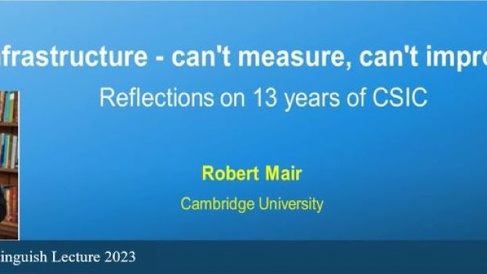
The CSIC Distinguished Lecture 2023 titled "Infrastructure - can't measure, can't improve?" is now available to view on the CSIC YouTube channel.
During his Distinguished Lecture, Professor Mair provided a detailed account of the 13-year history of the Cambridge Centre for Smart Infrastructure and Construction (CSIC). The lecture's title was inspired by a famous statement by Lord Kelvin in 1883: "If you cannot measure it, you cannot improve it". Professor Mair emphasised the importance of monitoring to understand the performance of infrastructure and therefore improve it. The lecture focused mainly on innovative Fibre Optic (FO) sensing systems, which have been a very important part of CSIC’s activities and its success. It showcased a number of CSIC case studies and projects, featuring a range of innovative examples of CSIC’s work on performance-based design improvements, construction control, current infrastructure evaluation and early warning detection systems.
If a car can be made smart enough to spot when the oil is low, or brake light has failed, the same can be done for bridges, tunnels and buildings. CSIC over the last 13 years has deployed novel sensors on over 100 different construction sites with the aim to transform the future of infrastructure, enabling better decision making through smarter information. Professor Lord Robert Mair CBE
Professor Mair stated that since its inception, researchers at CSIC saw the potential to apply the use of newly developed FO sensing technologies to the monitoring of civil engineering structures during construction, and also for evaluating the whole life of new and existing assets. Research work created new techniques to measure strain and temperature with FO to infer movement, displacement, and cracking for various types of structures, providing unprecedented spatial resolution. This has been applied to numerous cases of piles, retaining walls, structures and tunnels, providing important new insights into detailed soil-structure interaction mechanisms in large, complex civil engineering structures.
In conclusion, Professor Mair emphasised the enormous potential of FO sensing, the importance of data in maximizing the efficiency of new and existing infrastructure, the current era of digital transformation being essential for this purpose: “The infrastructure industry must choose to be smart in order to shape a better future and provide better whole-life value”. He expressed his gratitude to CSIC’s industry partners, including infrastructure clients, owners, operators, consultants, asset managers, and the technology and information supply chain, for their invaluable support and contributions.
Read more highlights on the lecture in PBC Today November issue.
References:
Distributed Fibre Optic Strain Sensing for Monitoring Civil Infrastructure: A Practical Guide
Fibre Optic monitoring of a deep circular excavation
Field measurements of ground movements associated with circular shaft construction
Case studies of circular shaft construction in London
Strain monitoring using embedded distributed fibre optic sensors in a sprayed concrete tunnel lining during the excavation of cross-passages
Innovative monitoring of the response of a heritage masonry building to nearby tunnelling in London Clay
Fibre optic sensing of ageing railway infrastructure enhanced with statistical shape analysis
